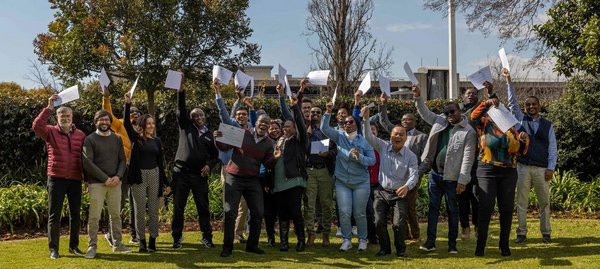 Read this article in French
Read this article in French- Share this article
- Subscribe to our newsletter
Building a community of practice to guide rural development
The government ministries responsible for rural development often lack the capacity and resources to effectively integrate environmental and social considerations, as well as to mainstreaming key topics such as gender transformation, youth, climate change and nutrition in their programmes.
The International Fund for Agricultural Development (IFAD) recognised this challenge and developed the Social, Environmental and Climate Assessment Procedures (SECAP) to mitigate the risks their projects and initiatives might bear for sustainable development.
Through the SUSTAIN initiative, implemented by the Swiss organisation Helvetas, efforts are being made to empower governments and local stakeholders to understand, implement and adhere to these standards. By empowering national ministries, trainers and project staff to identify and manage these risks, the SUSTAIN initiative paves the way for equitable, socially inclusive and environmentally sustainable rural transformation.
IFAD’s SECAP – a comprehensive framework
IFAD's SECAP is a holistic approach to integrating ESC standards into rural development projects. The framework consists of nine standards that governments should integrate into the implementation of agricultural projects. These standards cover a wide range of aspects, including biodiversity conservation, resource efficiency, cultural heritage, indigenous peoples' rights, labour conditions, community health and safety, resettlement, financial intermediaries, direct investments and climate change adaptation. SECAP also includes a mechanism for complaints that allows affected parties to voice concerns if the standards are not met.
ESC integration within rural development projects is pivotal for multiple reasons. First, it safeguards the environment and prevents irreversible damage to ecosystems and agrosystems. Neglecting these factors can lead to deforestation, soil degradation, pollution and loss of biodiversity — all of which have long-term consequences for local communities and ecosystems.
Second, ESC standards focus on safeguarding the rights and well-being of Indigenous Peoples, communities and labourers. Without these considerations, vulnerable populations can be marginalised and exploited, exacerbating inequalities. Lastly, incorporating climate considerations is vital for adaptation and resilience-building in the face of changing climate patterns.
SUSTAIN's approach to ESC Integration
The SUSTAIN initiative implemented by HELVETAS aims to bridge the gap between knowledge and practice. SUSTAIN takes a participatory approach to raise awareness in all low and lower-middle income countries in Africa and the Asia-Pacific Region where IFAD implements projects — a total of 59 countries. The initiative trains and coaches (both face-to-face and online) 400 implementing government staff and 200 consultants and project implementing partners.
By collaborating closely with stakeholders from the project's design phase, SUSTAIN ensures that the SECAP standards are not just theoretical but also practically applicable. Every stage of the initiative is carried out in consultation and close collaboration with stakeholders, including brainstorming the SECAP curriculum and creating a shared vision of how to best roll out future training.
Training the trainers and building a community of practice
One of the core strategies of the SUSTAIN initiative is the creation of a pool of SECAP-certified trainers who will cascade the SECAP training to other trainers and project implementation staff. This ensures the sustainability of knowledge transfer and capacity building.
The first Training of Trainers event, launched in July 2023 in Johannesburg/RSA, served as both a training opportunity and a curriculum validation exercise. Another Training of Trainers will take place in autumn for francophone African countries, serving as a starting point for the launch of SECAP trainings.
In the course of 2023, the initial group of countries undergoing training include Cambodia, Bangladesh, Laos, Benin, Niger, Madagascar, Lesotho and Ethiopia. This training initiative aims to directly benefit over 100 project management professionals. In 2024, the scope of the training programme will expand to encompass more countries. Supplementary ad-hoc online events and exchanges will also indirectly involve even more individuals in this capacity-building endeavour.
Recognising the limitations of in-person training, SUSTAIN also employs an online component for knowledge development. Participants complete the first part of the training in an online course about the nine standards, which serves as a prerequisite for being trained in person at the SECAP training.
(HELVETAS/wi)
More information:
The Social, Environmental, and Climate Assessment Procedures (SECAP)





Add a comment
Be the First to Comment